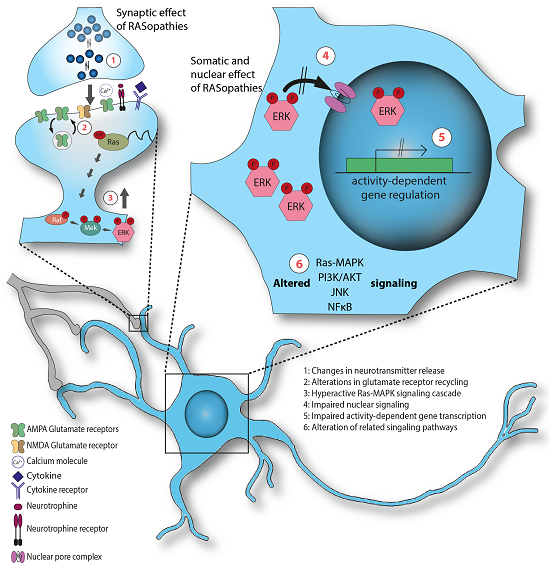TP2 - FP1
Neurobiology and neurocognitive function in mouse models of RASopathies
Congenital changes in the RAS-mitogen activated protein kinase (MAPK) signaling pathway can lead to Noonan syndrome, Neurofibromatosis type 1 (NF1), cardiofaciocutaneous syndrome (CFCS) or similar disorders. These RASopathies are characterized by an overlapping pattern of physical abnormalities and variable cognitive impairment. Unfortunately, suitable treatment of cognitive deficits is still hampered by the lack of understanding of the underlying neuronal mechanisms. We will use mouse mutants, expressing mutations identified in patients with RASopathies in brain, to address the effect of the RAS-MAPK pathway on brain function. Three different mutants are available in the consortium and one novel mutant will be generated. Using neuron cultures and acute slice from these models for RASopathies, we will investigate changes in neural differentiation, transmission and plasticity. In this approach we identify cellular processes and molecular pathways affected, both at the synaptic and transcriptional level and test possibility of pharmacological intervention to rescue mutation-induced deficits. In parallel, we will determine the effect of Ras-MAPK pathway mutations on motor, emotional social and cognitive behavior. It is our goal to validate these mouse mutants as animal models for cognitive disturbance in RASopathies, suitable for preclinical testing with aim to rescue the cognitive failure by pharmacological treatment. The combination of cellular and behavioral approaches will furthermore allow us to define and explore new therapeutic entry sites.

The figure shows roles of MAPK-RAS signaling in neuronal function and plasticity underlying normal cognition. These cellular processes are likely to be impaired in RASopathies and will be studied at molecular, cellular and systemic levels using animal models in the frame of our project.
Major goals:
- To provide insights into the function and plasticity of small neuronal networks in the presence of activating mutations of Ras pathway genes.
- To characterize behavioral abnormalities in transgenic mice with selective deregulation of the Ras-MAPK pathway in brain.
- To explore mouse models for preclinical studies to treat neurocognitive deficiencies in RASopathies.







